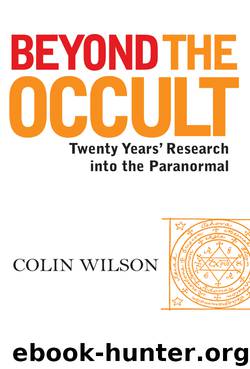Beyond the Occult by Colin Wilson

Author:Colin Wilson
Language: eng
Format: epub, azw3
Tags: Beyond the Occult
Publisher: Watkins Publishing
Published: 2013-05-06T16:00:00+00:00
Part Two
Powers of Good and Evil
1
The Search for Evidence
I have so far been able to present this material in a fairly impersonal and logical manner. Now it becomes necessary to speak again of my own involvement in the ‘search for evidence’.
In the opening chapter I explained how my interest in the ‘occult’ was a natural development of an interest in mystical experience. And the interest in mystical experience was in turn a development of my interest in those curious states of happiness and affirmation that Chesterton called ‘absurd good news’. In this state one thing is fundamentally clear: that our ordinary consciousness is bedevilled with certain errors or fallacies that have the effect of making life seem dull and ordinary. The demon Screwtape told his nephew Wormwood, ‘Thanks to processes which we set at work in human beings centuries ago, they find it all but impossible to believe in the unfamiliar while the familiar is before their eyes. Keep pressing home on him the ordinariness of things … .’
Now this inability to believe in the unfamiliar while the familiar is at hand is, quite simply, a form of hypnosis. ‘Familiarity’ makes a few mysterious passes in front of our eyes: our minds go blank, and the world is suddenly ‘ordinary’ and rather boring. And our response to ordinariness is to sink into a state of passivity: it seems self-evident that it is not worth making any effort. Most people spend their lives in the ‘hypnotized’ state, and die wondering why they were born in the first place.
This explains why the romantics of the nineteenth century made such frenzied efforts to escape from ‘ordinariness’, even if it meant becoming alcoholics, drug addicts or suicides. Rimbaud wrote, ‘I say that one must be a visionary — that one must make oneself a VISIONARY.’ And he spoke of a ‘reasoned derangement of the senses’: ‘I accustomed myself to simple hallucination: I really saw a mosque in place of a factory, angels practising on drums, coaches on the roads of the sky, a drawing room at the bottom of a lake … .’
But the real aim of all the romantics was to achieve those moments when consciousness seems to heave a sigh of relief and expand into a marvellous sense of the sheer richness of things: when it becomes aware — as Hesse’s Steppenwolf puts it — of ‘Mozart and the stars’. In this sense we are all romantics: the romantic impulse is one of the most fundamental drives of the human race. We make the mistake of thinking that we enjoy holidays because they allow us to recuperate, to recruit our energies. This is untrue. We enjoy holidays because they fill us with courage. They remind us that the world is a richer and more interesting place than we had come to believe, and that the stakes we are playing for are unbelievably high. Ordinary consciousness tends towards depression, which is another name for discouragement. By making us again aware of the sheer variety of the world, holidays fill us with new courage and determination.
Download
This site does not store any files on its server. We only index and link to content provided by other sites. Please contact the content providers to delete copyright contents if any and email us, we'll remove relevant links or contents immediately.
| Ancient & Controversial Knowledge | Ghosts & Hauntings |
| Hermetism & Rosicrucianism | Magic Studies |
| Occultism | Parapsychology |
| Supernatural | UFOs |
| Unexplained Mysteries |
Animal Frequency by Melissa Alvarez(4472)
Sigil Witchery by Laura Tempest Zakroff(4246)
Real Magic by Dean Radin PhD(4129)
Fingerprints of the Gods by Graham Hancock(4004)
Aleister Crowley: The Biography by Tobias Churton(3640)
Journeys Out of the Body by Robert Monroe(3624)
Alchemy and Alchemists by C. J. S. Thompson(3522)
The Rosicrucians by Christopher McIntosh(3519)
Mysteries by Colin Wilson(3454)
Hitler's Monsters by Eric Kurlander(3343)
The Hatha Yoga Pradipika (Translated) by Svatmarama(3342)
Wicca: a guide for the solitary practitioner by Scott Cunningham(3178)
John Dee and the Empire of Angels by Jason Louv(3166)
Infinite Energy Technologies by Finley Eversole(2984)
Book of Life by Deborah Harkness(2939)
Dark Star Rising by Gary Lachman(2867)
The Book of Lies by Aleister Crowley(2846)
Aliens by Jim Al-Khalili(2829)
To Light a Sacred Flame by Silver RavenWolf(2823)
